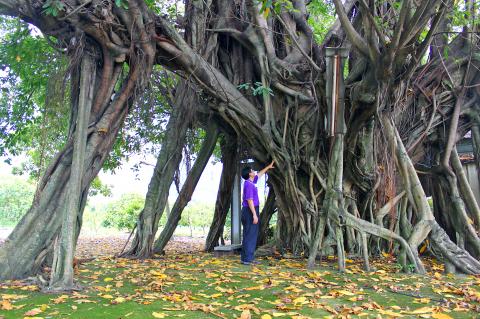Residents of Sinsing Borough (新興) in Kaohsiung’s Liouguei District (六龜) have petitioned the municipal government to list a 150-year-old Chinese banyan tree in the borough as an item of commemorative value and take measures to better care for it.
At five stories tall, the tree stands in a small community, providing shade from the sun for what locals say has been at least 150 years.
Once a popular transit point for rafters, the borough has not seen such visitors since Typhoon Morakot in 2008. Elderly people in the borough take advantage of the shade and can often be seen sitting under the tree, making tea and chatting.

Photo: Chen You-cheng, Taipei Times
Borough Warden Chiu Jui-ming (邱瑞明) said the tree, which is in a park called Da Ronggong (大榕公), has been part of his life since he was a child and is a notable landmark for residents.
Chiu said the tree was a popular place for village children to play.
A then-70-year-old two decades ago said that the tree was planted by the elderly person’s grandfather, Chiu said, adding that if the claim was true, the tree is nearly 150 years old.
The tree, with a girth that four adults can link hands around, has never been inspected for any illnesses, Chiu said.
The tree has become a gathering spot for locals and holds a special place in everyone’s heart, Chiu said, adding that many are worried that the tree might one day become too large and branches could break because it would not be able to sustain their weight.
“We hope that if the municipal government makes it a commemorative tree, it would give it better ‘health insurance’ and prompt residents and the authorities to better care for it,” Chiu said.
“We hope that tree lovers nationwide will visit and admire the tree’s magnificence and beauty,” Chiu said.
In response to the petition, the city government’s Division of Plant Life Protection and Ecology Conservation said that regulations for trees to obtain commemorative value are that they must be at least 60 years old, have branches at least 1.3m above the ground and be at least 1m in diameter.
Division director Lin Chih-hsien (林志嫻) said it is best if the tree has a specific or unique history; a special reason that means it should be commemorated.

US climber Alex Honnold is to attempt to scale Taipei 101 without a rope and harness in a live Netflix special on Jan. 24, the streaming platform announced on Wednesday. Accounting for the time difference, the two-hour broadcast of Honnold’s climb, called Skyscraper Live, is to air on Jan. 23 in the US, Netflix said in a statement. Honnold, 40, was the first person ever to free solo climb the 900m El Capitan rock formation in Yosemite National Park — a feat that was recorded and later made into the 2018 documentary film Free Solo. Netflix previewed Skyscraper Live in October, after videos

NUMBERS IMBALANCE: More than 4 million Taiwanese have visited China this year, while only about half a million Chinese have visited here Beijing has yet to respond to Taiwan’s requests for negotiation over matters related to the recovery of cross-strait tourism, the Tourism Administration said yesterday. Taiwan’s tourism authority issued the statement after Chinese-language daily the China Times reported yesterday that the government’s policy of banning group tours to China does not stop Taiwanese from visiting the country. As of October, more than 4.2 million had traveled to China this year, exceeding last year. Beijing estimated the number of Taiwanese tourists in China could reach 4.5 million this year. By contrast, only 500,000 Chinese tourists are expected in Taiwan, the report said. The report

Temperatures are forecast to drop steadily as a continental cold air mass moves across Taiwan, with some areas also likely to see heavy rainfall, the Central Weather Administration (CWA) said. From today through early tomorrow, a cold air mass would keep temperatures low across central and northern Taiwan, and the eastern half of Taiwan proper, with isolated brief showers forecast along Keelung’s north coast, Taipei and New Taipei City’s mountainous areas and eastern Taiwan, it said. Lows of 11°C to 15°C are forecast in central and northern Taiwan, Yilan County, and the outlying Kinmen and Lienchiang (Matsu) counties, and 14°C to 17°C

STEERING FAILURE: The first boat of its class is experiencing teething issues as it readies for acceptance by the navy, according to a recent story about rudder failure The Hai Kun (海鯤), the nation’s first locally built submarine, allegedly suffered a total failure of stern hydraulic systems during the second round of sea acceptance trials on June 26, and sailors were forced to manually operate the X-rudder to turn the submarine and return to port, news Web site Mirror Daily reported yesterday. The report said that tugboats following the Hai Kun assisted the submarine in avoiding collisions with other ships due to the X-rudder malfunctioning. At the time of the report, the submarine had completed its trials and was scheduled to begin diving and surfacing tests in shallow areas. The X-rudder,